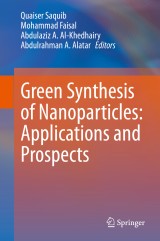Details

Green Synthesis of Nanoparticles: Applications and Prospects
|
234,33 € |
|
| Verlag: | Springer |
| Format: | |
| Veröffentl.: | 19.10.2020 |
| ISBN/EAN: | 9789811551796 |
| Sprache: | englisch |
Dieses eBook enthält ein Wasserzeichen.
Beschreibungen
<p>This book describes various strategies for the synthesis of green nanoparticles using plant extracts and microbes, including the advantages and disadvantages of different methods and their applications.</p><p>After discussing strategies for and the potential of green synthesis of noble metal nanoparticles, it highlights the role of the solvent system. The book then explores the stability/toxicity of nanoparticles and the associated-surface engineering techniques for achieving biocompatibility, and examines the antimicrobial efficacy of green nanoparticles with regard to various bacterial pathogens, as well as the underlying cytotoxicity mechanisms.</p><p>Lastly, the book addresses the potential applications of various green nanoparticles in cancer theranostics, and reviews a number of plant-mediated nanoparticles as potential pharmaceutical agents. Given its scope, the book will be of interest to all scientists and students wanting to learn more about the synthesis and applicationsof green nanoparticles.</p><div><br></div>
Chapter 1. Research Progression on Studies Related to Green Synthesis Nanoparticles: A Bibliometric Review.- Chapter 2. Current Green Nanotechnology: The Case of Noble Metal Nanocomposites and Applications.- Chapter 3. Role of Solvent System in Green Synthesis of Nanoparticles.- Chapter 4. Surface Engineering Techniques Associated with Stability, Biocompatibility and Toxicity of Nanoparticles.- Chapter 5. Role of Light in the Improvement of Nanoparticles Synthesis.- Chapter 6. Application of Nanomaterials for Cancer Diagnosis and Therapy.- Chapter 7. Marine Resources for Biosynthesis and Surface Modification of Anticancer Nanoparticles.- Chapter 8. Green Synthesis of Nanoparticles and Their Application in Cancer Therapy.- Chapter 9. Gold Nanoparticles: Biogenic Synthesis and Anticancer Application.- Chapter 10. Toxicity and Synthesis of Bacteriogenic Silver Nanoparticles Against Bacterial Pathogens: A Critical Review.- Chapter 11. Green Synthesis of Selenium Nanoparticles (SeNPs) via Environment-Friendly Biological Entities.- Chapter 12. Biogenic Synthesis, Characterization, Toxicity Assessment, Antiparasitic and Antibacterial Activities of Silver Nanoparticle from Lippia Multiflora.- Chapter 13. Green Synthesis of MgO Nanoparticles and its Effect on Chlorophyll Content in Plant Tissue Culture.- Chapter 14. Application of Green Nano-silica in Civil Engineering.
<p>Dr. Quaiser Saquib is currently working as an Associate Professor and Coordinator of Al-Jeraisy Chair for DNA Research at the College of Sciences, King Saud University, Riyadh, Saudi Arabia. For the last 12 years, he has been working in the areas of molecular toxicology of nanoparticles, green synthesis of nanoparticles, toxicity of pesticides, flame retardants, bisphenols, and anti-cancer drugs. In addition, he is an expert on biophysical studies of biological macromolecules, including the interaction mechanisms of binding exogenous ligands with DNA and human serum albumin.</p><p>Dr. Saquib received the SESR Bioscientist Award (2018), Scientist of the Year Award (2016) and EMSI Young Scientist Award (2008). Further, he has published over 72 research articles, three books, and six book chapters.</p><p>Dr. Mohammad Faisal has over 12 years of research experience in plant biotechnology and is currently working as an Associate Professor at the Department of Botany & Microbiology, King Saud University, Riyadh, Saudi Arabia. He received the Plant Biotechnologist Award (2017) from the SESR, India, and the NESA Scientist of the Year Award (2015), as well as several national and international fellowships. He is a member of various academic bodies/societies and a fellow of the SESR. He has published over 70 research articles, three book chapters, and four books. Further, he serves on the editorial boards of numerous respected journals.</p><p>Professor Abdulaziz A. Al-Khedhairy is currently serving as Director of the Al-Jeraisy Chair for DNA Research at King Saud University, Riyadh, Saudi Arabia. He has published more than 190 research articles, three books and nine book chapters, and holds one US patent. Prof. Abdulaziz has worked on the molecular genetics of inherited diseases in the Saudi community, and on interactions of eukaryotic DNA with genotoxic chemicals and their prolonged effects on human genes.</p><p>Dr. Abdulrahman Alatar is a Professor at the Departmentof Botany & Microbiology, King Saud University, Riyadh, Saudi Arabia. He also serves as a consultant for human resources and management at the Ministry of Higher Education, Saudi Arabia. He has published more than 60 scientific articles and three books.</p><div><br></div>
<div>This book describes various strategies for the synthesis of green nanoparticles using plant extracts and microbes, including the advantages and disadvantages of different methods and their applications.</div><div>After discussing strategies for and the potential of green synthesis of noble metal nanoparticles, it highlights the role of the solvent system. The book then explores the stability/toxicity of nanoparticles and the associated-surface engineering techniques for achieving biocompatibility, and examines the antimicrobial efficacy of green nanoparticles with regard to various bacterial pathogens, as well as the underlying cytotoxicity mechanisms.</div><div>Lastly, the book addresses the potential applications of various green nanoparticles in cancer theranostics, and reviews a number of plant-mediated nanoparticles as potential pharmaceutical agents. Given its scope, the book will be of interest to all scientists and students wanting to learn more about the synthesis and applications of green nanoparticles.</div><div><br></div>
Summarizes various strategies in the synthesis of green nanoparticles using plant extracts and microbes Presents applications of green nanoparticles as potential anticancer agents Explores the antimicrobial efficacy of various green nanoparticles Reviews the stability/toxicity of nanoparticles and associated-surface engineering techniques for achieving biocompatibility
Diese Produkte könnten Sie auch interessieren:

The Neural Crest and Neural Crest Cells in Vertebrate Development and Evolution

von: Brian K. Hall

149,79 €















